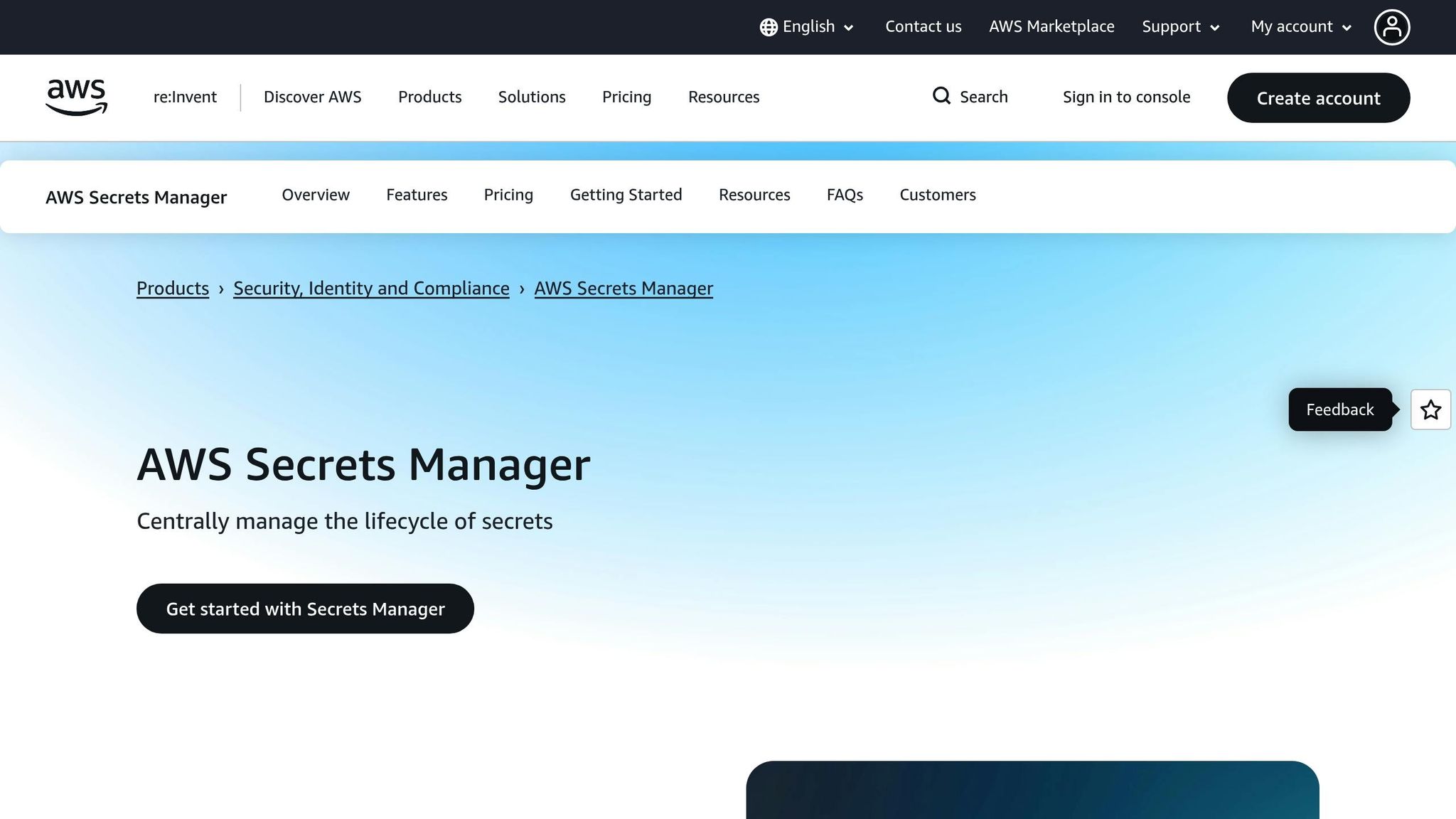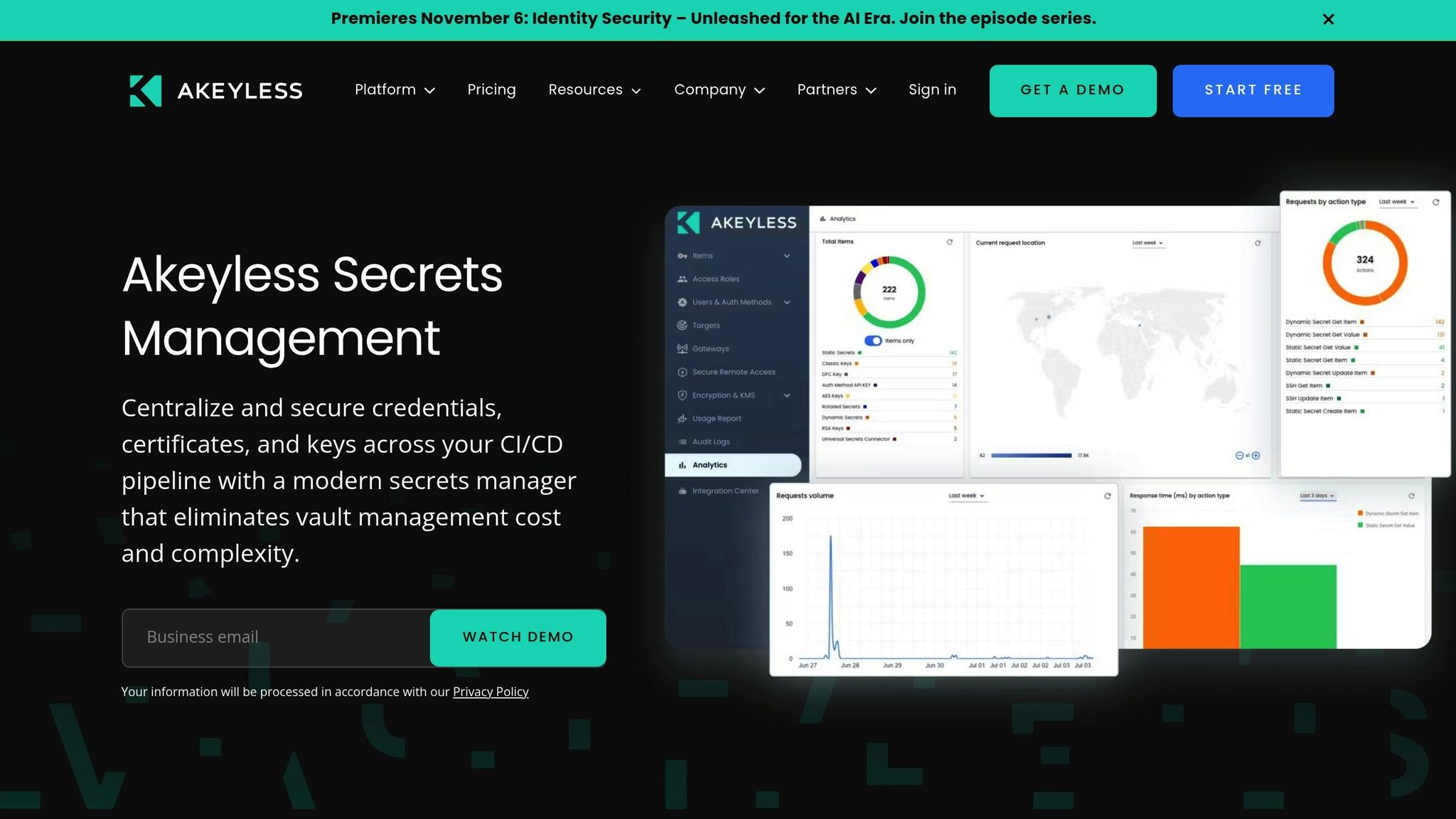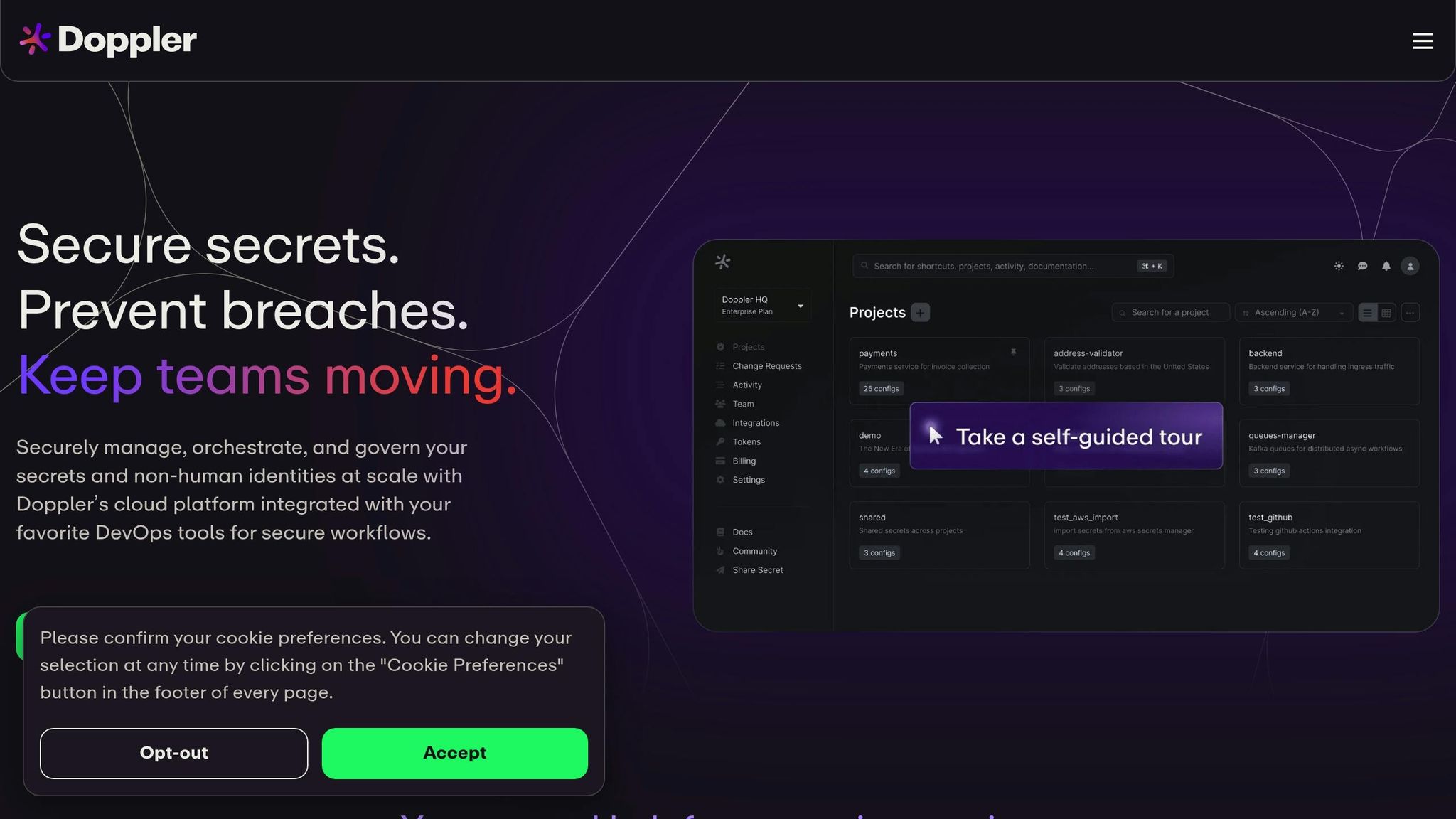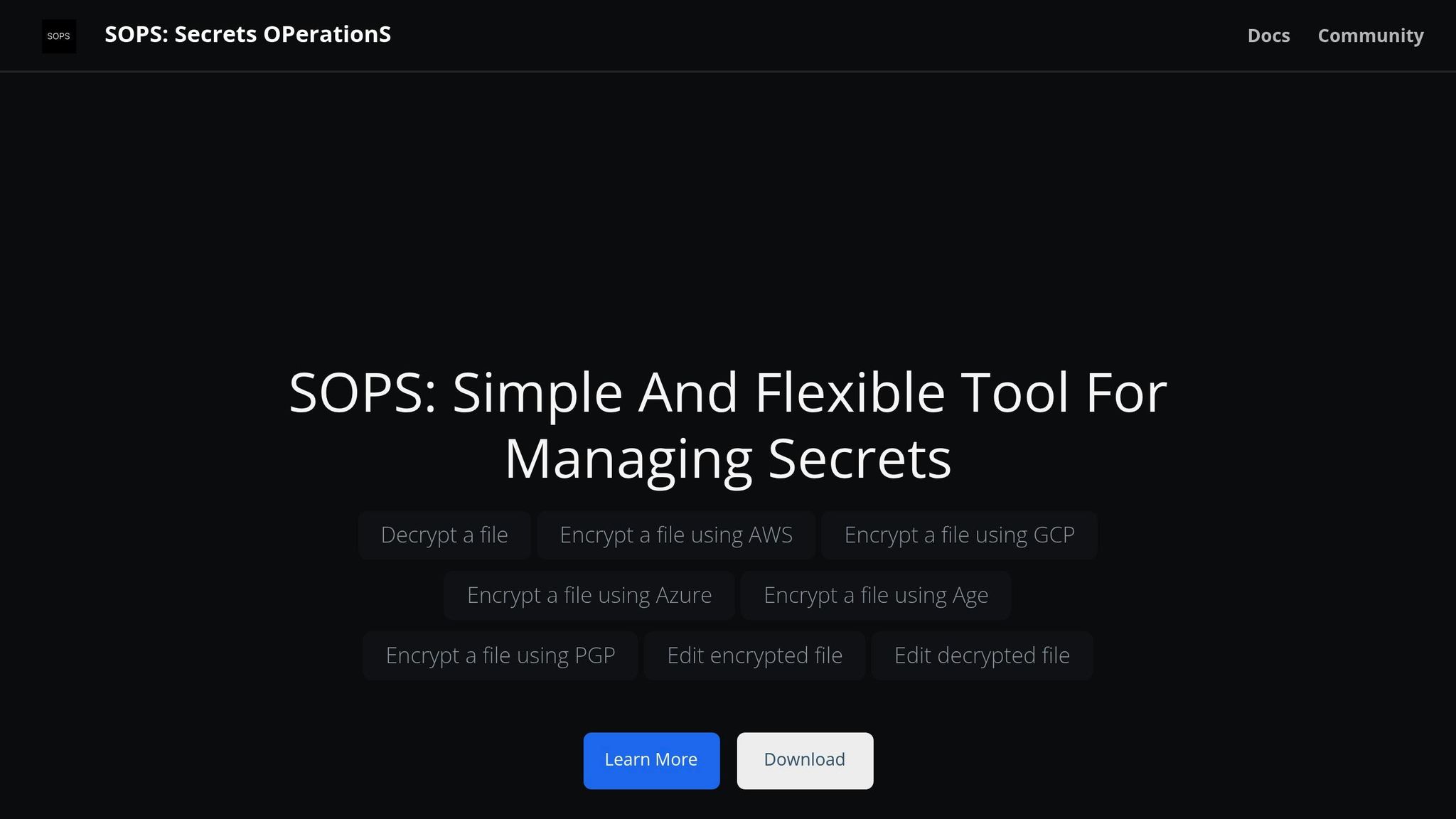Managing sensitive credentials in DevOps is critical for security and compliance, especially in the UK. With the rise of cloud-native systems, microservices, and automated CI/CD pipelines, the risk of credential exposure is higher than ever. Secrets management tools can help protect API keys, passwords, and other sensitive data while ensuring compliance with GDPR and other regulations.
This article compares five popular secrets management tools - HashiCorp Vault, AWS Secrets Manager, Akeyless, Doppler, and SOPS - based on key factors like encryption, ease of use, integration, compliance, and cost. Each tool has unique strengths, making them suitable for different use cases:
- HashiCorp Vault: Best for complex, multi-cloud setups with dynamic secrets but requires advanced expertise.
- AWS Secrets Manager: Ideal for AWS-centric teams with seamless integration but limited for multi-cloud environments.
- Akeyless: SaaS-native with strong encryption and multi-cloud support; great for organisations with hybrid infrastructure.
- Doppler: Focused on developer usability and collaboration, perfect for agile teams, but lacks advanced compliance features.
- SOPS: Lightweight and open-source, tailored for Kubernetes and GitOps workflows but limited in centralised management.
What Tools Are Used For Secrets Management? - SecurityFirstCorp.com
Quick Comparison
| Feature | HashiCorp Vault | AWS Secrets Manager | Akeyless | Doppler | SOPS |
|---|---|---|---|---|---|
| Deployment Model | Self-hosted/Cloud | AWS Managed | SaaS-native | SaaS-native | Self-hosted |
| Multi-cloud Support | ✅ Extensive | ❌ AWS-only | ✅ Universal | ✅ Broad | ✅ Cloud-agnostic |
| Dynamic Secrets | ✅ Built-in | ❌ Limited | ✅ Advanced | ❌ Static only | ❌ File-based |
| Compliance Features | Advanced policies | AWS CloudTrail | GDPR-ready | Basic audit logs | Limited |
| Starting Cost | Free/Custom | ~£0.30/secret/month | Custom pricing | £12/user/month | Free |
| Best For | Complex enterprises | AWS-centric teams | Multi-cloud orgs | Developer teams | Kubernetes/GitOps |
Key takeaway: Whether you're a small team or a large enterprise, selecting the right tool depends on your infrastructure, compliance needs, and expertise. For UK businesses, ensuring GDPR compliance and secure secret rotation is essential. Read on for detailed insights into each tool's features and practical advice for implementation.
How We Compare Secrets Management Tools
UK enterprises need secrets management tools that balance strict regulatory compliance with the fast-paced demands of modern development. Our analysis focuses on five critical areas that directly impact both security and efficiency. These criteria reflect the practical challenges faced by DevOps teams in the UK, from meeting GDPR obligations to ensuring seamless integration with existing cloud infrastructure. Below, we break down each evaluation point to help you make an informed choice.
Encryption and Security Features
When it comes to encryption, we evaluate the strength of the algorithms (like AES-256+), zero-knowledge encryption, and automatic secret rotation.
Akeyless leads with its patented Distributed Fragments Cryptography (DFC™), which ensures decryption keys are never fully exposed outside the customer’s environment. This method significantly reduces the risk of breaches compared to traditional encryption approaches. HashiCorp Vault offers dynamic secret generation and fine-grained access control, allowing secrets to be created on demand and automatically revoked when no longer needed.
AWS Secrets Manager employs Lambda functions for automatic rotation, while HashiCorp Vault also supports dynamic secrets with built-in rotation. These features are critical for UK DevOps teams aiming to minimise credential leaks and maintain compliance without relying on manual processes.
Additionally, audit logging and encryption (both at rest and in transit) are essential. Every access event should be logged, creating detailed audit trails that help teams respond to incidents quickly and demonstrate compliance during regulatory audits.
Ease of Use and Developer Experience
The usability of a secrets management tool often determines how quickly it’s adopted by developers. Complex tools can slow down projects and increase costs due to the need for extensive training.
Doppler and Akeyless score highly for their user-friendly onboarding processes and effortless integration with CI/CD pipelines. In contrast, HashiCorp Vault, while powerful, has a steeper learning curve due to its advanced features.
Key factors in our assessment include the quality of documentation, the availability of CLI tools, and how easy it is to set up initially. Tools that offer clear migration paths from existing systems and detailed API documentation tend to see faster adoption rates among development teams.
Integration and Compatibility
DevOps workflows rely on a mix of CI/CD tools, cloud platforms, and identity providers, making integration capabilities a vital consideration. We examine how well each tool integrates with CI/CD pipelines (like Jenkins, GitHub Actions, and GitLab), major cloud platforms (AWS, Azure, GCP), and identity providers (such as Okta, Azure AD, and AWS IAM).
AWS Secrets Manager integrates seamlessly with AWS services but may lack flexibility for multi-cloud setups. Akeyless, on the other hand, offers a Universal Secrets Connector for centralised management across various platforms, while HashiCorp Vault provides extensive support for hybrid and multi-cloud environments.
Native plugins and APIs reduce the need for custom integrations. Features like automating secret injection into deployment pipelines and compatibility with infrastructure-as-code tools like Terraform are becoming increasingly important.
Compliance and Localisation
For UK enterprises, GDPR compliance is non-negotiable. Our evaluation considers how well each tool supports audit logging, role-based access control, and data residency options to meet strict regulatory standards.
Top-performing tools allow organisations to store secrets within UK or EU jurisdictions, ensuring compliance with data protection laws. Some platforms even offer compliance reporting features to simplify audits and demonstrate adherence to regulations.
Localisation features such as UK date formats (DD/MM/YYYY) and currency in pounds (£) further enhance usability for teams based in the UK.
Cost and Scalability
After examining technical capabilities and integration options, we turn to cost and scalability. Pricing models vary widely, so understanding the total cost of ownership is crucial.
Doppler uses a user-based pricing model, starting at around £12 per user per month, with enterprise features available through custom plans. AWS Secrets Manager charges approximately £0.32 per secret per month, with additional costs for API calls.
Some platforms offer free tiers or open-source options. For example, HashiCorp Vault provides a free open-source version, while Akeyless offers trial periods for enterprise features. The overall cost includes licensing, operational overhead, training, and infrastructure expenses for self-hosted solutions.
SaaS-based tools often provide predictable scaling, while self-hosted options may give better cost control for large-scale deployments but require more operational expertise.
For UK enterprises navigating these choices, consulting specialists like Hokstad Consulting can help align tool selection with specific business needs and compliance requirements.
Secrets Management Tools Compared
Each secrets management tool has distinct advantages and trade-offs, making it essential to evaluate their performance in practical scenarios. For UK DevOps teams, understanding these tools' capabilities can help ensure the chosen solution fits their infrastructure needs and meets regulatory standards.
HashiCorp Vault
HashiCorp Vault is a technically advanced option, offering robust encryption and dynamic secret generation that provides credentials on demand. Its fine-grained policy management lets administrators precisely control who can access specific secrets, under what conditions, and for how long.
This platform shines in complex, multi-cloud setups, allowing organisations to manage secrets across AWS, Azure, Google Cloud, and on-premises systems simultaneously. Its compatibility with various identity providers and cloud key management services makes it particularly appealing for large UK enterprises with diverse infrastructure.
However, Vault's complexity can be a hurdle. Deploying and maintaining it requires significant DevOps expertise, which may challenge smaller teams. The steep learning curve often means organisations need weeks to fully utilise its advanced features.
Vault is flexible in deployment, running either on-premises for organisations with strict data residency requirements or in the cloud via the HashiCorp Cloud Platform (HCP). While the open-source version is free, enterprise features and managed services come with additional costs, which UK-based teams should budget for in GBP.
AWS Secrets Manager

AWS Secrets Manager integrates seamlessly with the AWS ecosystem, making it a natural fit for organisations heavily invested in Amazon's cloud services. Its integration with AWS Identity and Access Management (IAM) ensures that existing permission structures extend to secrets management without extra configuration.
The platform automates secret rotation, ensuring credentials are updated regularly, which reduces the risk of security incidents and limits manual intervention. For UK businesses primarily operating on AWS, this tool offers clear advantages. The managed service reduces operational overhead, and its predictable pay-per-secret pricing - around £0.40 per secret per month - scales with usage.
The main drawback is its AWS-centric design. While it excels within the AWS environment, its lack of flexibility for multi-cloud or hybrid setups may limit its appeal for organisations with diverse infrastructure or significant on-premises operations.
Akeyless Secrets Management

Akeyless takes a SaaS-native approach, eliminating the need for infrastructure management while providing enterprise-level security. Its patented Distributed Fragments Cryptography (DFC™) ensures that decryption keys never exist in their entirety outside the customer's environment, significantly reducing security risks.
The Universal Secrets Connector simplifies multi-cloud challenges, enabling centralised management across AWS, Azure, Google Cloud, and on-premises systems. This feature is particularly useful for UK organisations pursuing multi-cloud strategies or managing hybrid environments.
Akeyless complies with GDPR and data residency requirements, aligning well with modern security frameworks. Its SaaS model allows for rapid deployment and reduced operational demands. However, organisations with strict data sovereignty concerns should carefully assess where secrets are processed and stored to ensure compliance with UK and EU regulations.
Doppler

Doppler focuses on enhancing the developer experience, offering real-time secret synchronisation that ensures credentials are updated instantly across all environments. This feature is especially beneficial for fast-paced UK startups and agile teams, where rapid deployment cycles are crucial.
The platform's collaboration tools make it easy for teams to manage secrets across development, staging, and production environments without conflicts. Detailed activity logs provide transparency into changes, enhancing accountability.
Doppler integrates effortlessly with popular CI/CD tools like GitHub Actions, GitLab CI, and Jenkins, requiring minimal setup to inject secrets into deployment pipelines. Its user-friendly interface helps new team members get up to speed quickly.
However, Doppler may lack the advanced features demanded by larger organisations, such as dynamic secret generation, complex policy management, and in-depth compliance controls. This could be a limitation for industries with stringent regulatory needs.
SOPS (Simple and Secure Operations)

SOPS takes a unique approach by encrypting secrets directly within configuration files like YAML, JSON, or ENV, rather than using a centralised vault. This method aligns with Kubernetes and GitOps practices, which are increasingly popular among UK DevOps teams.
The tool integrates with cloud key management services such as AWS KMS, Google Cloud KMS, and Azure Key Vault, allowing organisations to leverage their existing infrastructure. Secrets remain encrypted in version control systems and are only decrypted at deployment, reducing exposure risks.
SOPS is ideal for smaller teams or those new to secrets management. As an open-source tool, it is free to use and requires minimal infrastructure to operate.
However, SOPS lacks centralised management features like advanced access controls, audit logging, and secret lifecycle management. These limitations may make it less suitable for large enterprises with complex compliance requirements or those needing features like automatic secret rotation and detailed audit trails.
When choosing a secrets management tool, UK teams should weigh their infrastructure complexity, compliance needs, and team expertise. For organisations with intricate requirements, consulting specialists like Hokstad Consulting (https://hokstadconsulting.com) can help ensure the chosen solution aligns with technical and regulatory demands. A thorough comparison of these tools will help teams make informed decisions.
Need help optimizing your cloud costs?
Get expert advice on how to reduce your cloud expenses without sacrificing performance.
Side-by-Side Tool Comparison
Using the evaluation criteria, here’s a detailed side-by-side comparison of some popular secrets management tools:
| Feature | HashiCorp Vault | AWS Secrets Manager | Akeyless | Doppler | SOPS |
|---|---|---|---|---|---|
| Deployment Model | Self-hosted/Cloud | AWS Managed | SaaS-native | SaaS-native | Self-hosted |
| Multi-cloud Support | ✅ Extensive | ❌ AWS-only | ✅ Universal | ✅ Broad | ✅ Cloud-agnostic |
| Dynamic Secrets | ✅ Built-in | ❌ Limited | ✅ Advanced | ❌ Static only | ❌ File-based |
| Encryption Approach | Transit encryption | AWS KMS integration | DFC™ technology | Standard encryption | File-level encryption |
| Developer Experience | Complex setup | Straightforward | User-friendly | Excellent | Moderate |
| Free Tier | ✅ Open source | ✅ Limited usage | Trial only | ✅ Basic features | ✅ Fully free |
| Starting Cost | Free/Custom | ~£0.30 per secret/month | Custom pricing | £12 per user/month | Free |
| CI/CD Integration | Extensive APIs | AWS-native tools | Universal connector | Native integrations | GitOps-focused |
| Compliance Features | Advanced policies | AWS CloudTrail | GDPR-ready | Basic audit logs | Limited |
| Learning Curve | Steep | Moderate | Gentle | Minimal | Moderate |
| Best For | Complex enterprises | AWS-centric teams | Multi-cloud orgs | Developer teams | Kubernetes/GitOps |
Key Insights from the Comparison
Each tool stands out in different areas, depending on specific needs and use cases. For example, HashiCorp Vault is the most versatile option, offering over 50 authentication methods and secret engines. However, its setup can be complex, requiring significant expertise. In contrast, AWS Secrets Manager simplifies secret rotation with Lambda functions, but this might demand extra configuration for more intricate environments.
Akeyless introduces a distinct edge with its DFC™ encryption, which aligns well with stringent UK regulatory requirements. This approach minimises breach risks compared to traditional centralised key management.
When it comes to cost and integration, the tools vary widely. Doppler’s pricing model, based on users, works well for smaller teams but can become costly as teams grow. AWS Secrets Manager’s per-secret billing can also add up quickly for large-scale deployments. Meanwhile, Vault’s robust API integrations make it highly adaptable, and Doppler shines with real-time synchronisation across development environments. SOPS, on the other hand, is a great choice for Kubernetes and GitOps workflows due to its seamless integration.
Operational Considerations
Managing operational overhead is another important factor. SaaS-based tools like Akeyless and Doppler eliminate the need for infrastructure management, saving time and resources. In contrast, self-hosted solutions like Vault require dedicated engineering resources to handle maintenance, updates, and high-availability configurations.
Compliance and Scalability
For compliance and scalability, Vault and Akeyless lead the pack with comprehensive auditing and fine-grained access controls. AWS Secrets Manager offers strong compliance features but remains confined to the AWS ecosystem. SOPS, while simpler, lacks extensive audit capabilities. When it comes to scaling, Vault and AWS Secrets Manager are well-suited for enterprise-level deployments, capable of handling thousands of requests simultaneously.
This comparison provides a solid foundation for choosing the right tool, helping you align your secrets management strategy with your organisation’s needs and deployment pipelines.
How to Implement Secrets Management Tools
Secrets management involves integrating tools into your existing DevOps workflows while adhering to UK compliance standards. Here's how to do it effectively.
Managing Secrets in CI/CD Pipelines
A key aspect of securing secrets is retrieving them dynamically during builds or deployments. Instead of hardcoding credentials or storing them in version control, use secure APIs or environment variables to fetch secrets at runtime[1][2].
For example, Jenkins users can utilise HashiCorp Vault plugins to pull credentials at build time, ensuring sensitive data stays out of scripts and logs[2]. AWS Secrets Manager offers similar functionality, injecting secrets into AWS Lambda or ECS tasks at runtime, with IAM roles providing precise access control[2].
Incorporating tools like Xygeni can further enhance security. These tools scan pull requests in real time, blocking unsafe merges and triggering automated token rotations when leaks are detected. This proactive approach enforces safe coding practices and includes workflows for revoking compromised credentials[1].
No matter the platform - whether it's GitHub Actions, GitLab CI, or Bitbucket Pipelines - secure secret injection methods are critical. These platforms support secret storage and external integrations designed to ensure secrets are only accessible when absolutely necessary, never appearing in logs or configuration files.
By adopting these practices, you not only strengthen security but also lay the groundwork for robust audit logging and seamless secret rotation.
Audit Logging and Compliance
Secure secret injection is just the beginning; building detailed audit logs is essential for UK and EU compliance[2][3].
Tools like HashiCorp Vault include audit devices that log every interaction, creating immutable records that can be stored in UK or EU data centres to meet data residency requirements[2][3]. Similarly, AWS Secrets Manager integrates with AWS CloudTrail, automatically logging access patterns and configuration changes.
For GDPR compliance, you must address data retention policies and the right to be forgotten.
Audit logs should be retained for the required duration, with options to anonymise or delete personal data when necessary. Most enterprise tools allow you to configure retention policies and automate log archival.
Integrating audit logs with SIEM (Security Information and Event Management) systems is a smart move for UK organisations. This integration supports real-time monitoring, helps identify unusual access patterns, and strengthens incident response capabilities.
To meet UK regulatory standards, logs must be stored in tamper-evident formats, regularly reviewed, and accessible for audits. Many companies find centralised logging platforms useful for managing large volumes of data while maintaining searchability and generating compliance reports.
Setting Up Automatic Secret Rotation
Automating secret updates is another crucial step in securing credentials. This involves regularly updating secrets without manual intervention, ensuring continuous service availability during the rotation process[2][3].
AWS Secrets Manager simplifies this with Lambda functions that handle rotation workflows. These functions can update database passwords, refresh API keys, and coordinate with target systems to update credentials seamlessly[2]. HashiCorp Vault takes it further with dynamic secrets, using predefined time-to-live (TTL) values to automatically generate and revoke credentials.
For multi-cloud environments, tools like Akeyless and HashiCorp Vault offer APIs and connectors that work across AWS, Azure, and on-premises systems, ensuring consistent rotation workflows regardless of infrastructure[3].
Rotation frequency should be determined by risk levels and compliance requirements. To avoid disruptions, implement robust alerting and rollback procedures for failed rotations. Most tools provide detailed logs of rotation events, enabling teams to troubleshoot issues and fine-tune schedules.
For UK organisations managing complex deployments, consulting firms like Hokstad Consulting can provide expert guidance. Their experience in DevOps transformation and cloud cost engineering ensures secrets management strategies align with broader infrastructure goals while meeting regulatory demands.
Conclusion: Picking the Right Secrets Management Tool
When selecting a secrets management tool, it's important to consider how well it aligns with your cloud strategy, compliance requirements, and available resources. This approach ensures you choose a solution that fits seamlessly with your infrastructure and regulatory obligations.
For operations primarily centred on AWS, AWS Secrets Manager is an excellent choice due to its smooth integration with the platform. However, if you're working across multiple cloud environments, tools like HashiCorp Vault or Akeyless may be better suited - though it's worth noting that Vault often demands greater in-house expertise to manage effectively.
For UK-based organisations, compliance is key. Tools must adhere to regulations like GDPR, ISO 27001, and industry-specific standards such as FCA guidelines. Features like robust audit logging, access controls, and data residency options within UK/EU jurisdictions are crucial for maintaining compliance.
Ease of use can also make a big difference in adoption. Doppler, for instance, is designed with developers in mind, offering straightforward deployment and pricing that starts at £12 per user per month. On the other hand, open-source solutions like SOPS are strong contenders for file encryption but may lack the lifecycle management capabilities needed by larger teams.
Cost structures vary widely between tools. HashiCorp Vault offers a free open-source version alongside paid managed services, while AWS Secrets Manager uses a pay-per-secret model that can become costly as your usage scales. SaaS-based options like Akeyless and Doppler often include free tiers for smaller teams, with custom pricing available for enterprise needs.
For organisations navigating complex multi-cloud setups or limited by in-house expertise, bringing in external specialists can simplify the process. Hokstad Consulting provides tailored support, focusing on DevOps transformation and cloud cost optimisation. They can help implement secure secrets management through automated CI/CD pipelines and Infrastructure as Code, ensuring your tools are seamlessly integrated into your workflows.
FAQs
How can secrets management tools help UK businesses meet GDPR and other regulatory requirements?
Secrets management tools are indispensable for UK businesses aiming to comply with GDPR and other regulations. They ensure sensitive information like API keys, passwords, and encryption keys is securely stored and accessed, minimising the risk of unauthorised access or data breaches - both critical for adhering to data protection standards.
These tools streamline the secure storage and retrieval of secrets by automating processes. They also enforce access controls, generate audit logs, and uphold encryption best practices, all of which are vital for meeting compliance requirements. Plus, many of these solutions integrate effortlessly with DevOps workflows, allowing businesses to maintain strong security measures without interrupting their operations.
How do HashiCorp Vault and AWS Secrets Manager differ for managing secrets in multi-cloud environments?
HashiCorp Vault and AWS Secrets Manager are both excellent tools for managing secrets, but they serve different purposes depending on your setup and priorities in multi-cloud environments.
HashiCorp Vault stands out for its flexibility and strong encryption capabilities. It's a great fit for organisations that need detailed control and customisation across various infrastructures. Vault supports multiple cloud platforms as well as on-premise environments. It also offers advanced features like dynamic secrets and policy-driven access, making it a versatile option for complex setups.
AWS Secrets Manager, on the other hand, is designed to integrate seamlessly with the AWS ecosystem. For businesses primarily operating within AWS, it simplifies secret management with features like automated secret rotation and close integration with other AWS services. However, it may not offer the same level of adaptability for organisations working across multiple cloud providers or hybrid environments.
Deciding between the two depends on your organisation's needs. Think about factors like how much customisation you require, your current infrastructure, and whether you're focused on a single cloud provider like AWS or need a solution that works across multiple platforms.
How can UK businesses choose the most cost-effective secrets management tool for their needs?
Choosing the right secrets management tool hinges on your organisation's unique needs. Key factors include the strength of encryption, user-friendliness, and how well the tool integrates with your existing DevOps workflows. It's essential to pick a solution that can securely handle sensitive data like API keys, passwords, and certificates.
For businesses in the UK, it's equally important to evaluate costs in GBP (£) and ensure the tool fits within your budget while supporting future growth. Opt for solutions that not only simplify compliance with data protection regulations but also integrate smoothly with your cloud infrastructure. This approach helps reduce operational complexities and ensures you're investing in a tool that delivers both security and value for your organisation.
